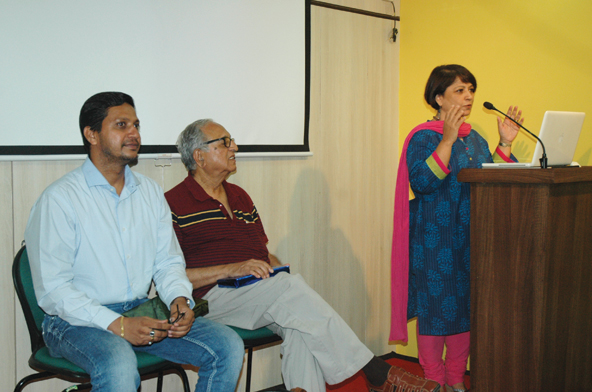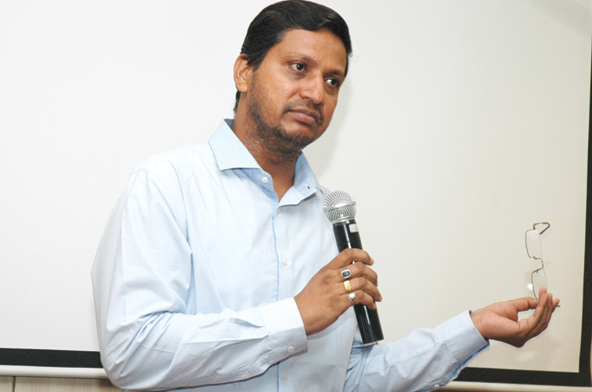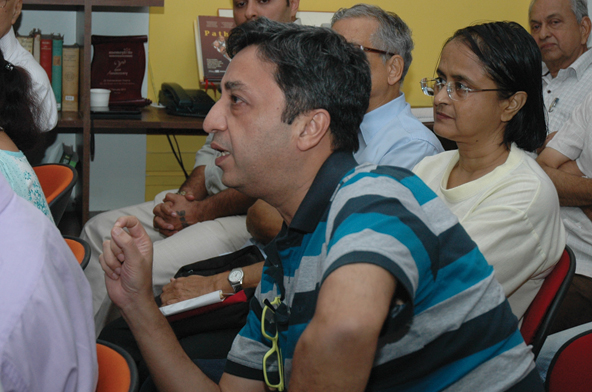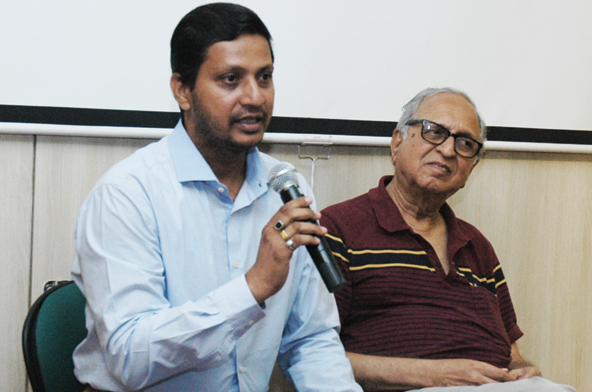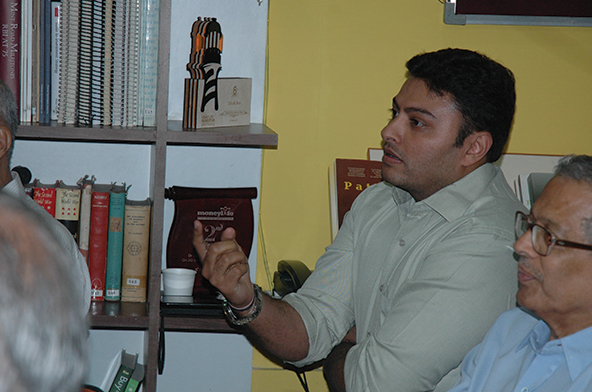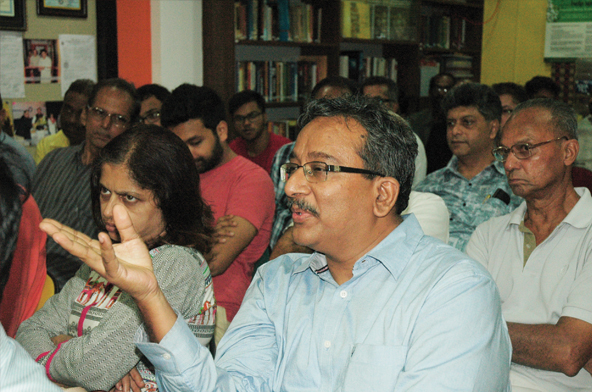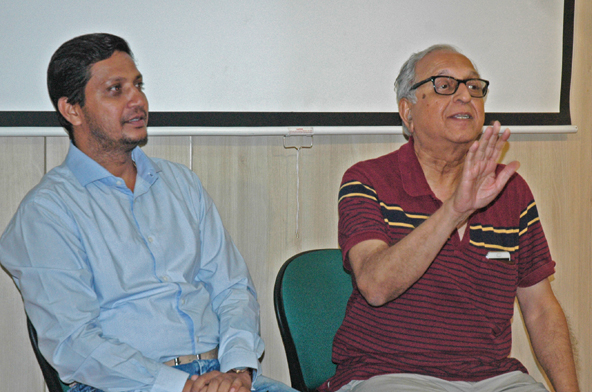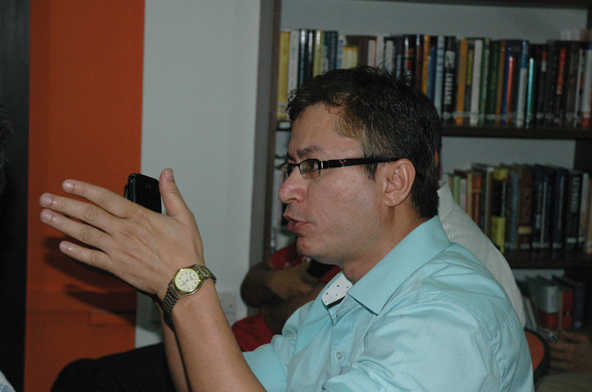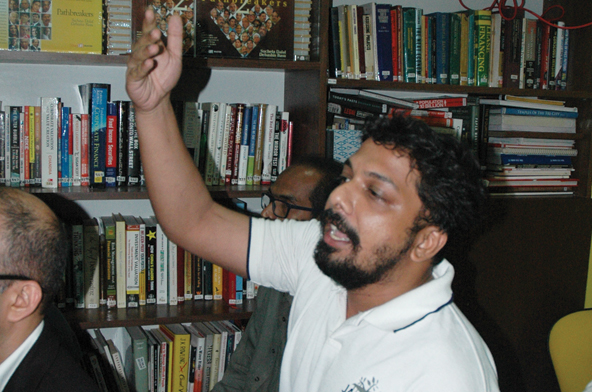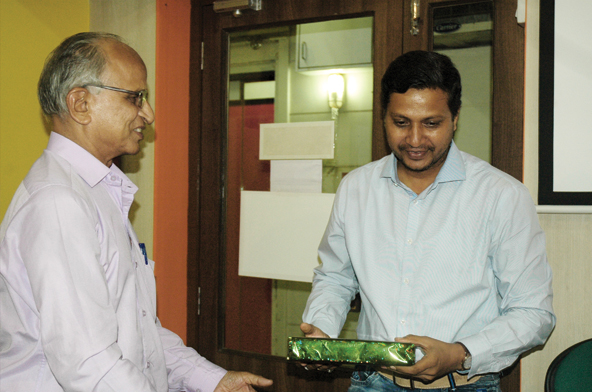
The size of the Budget for Municipal Corporation of Greater Mumbai (MCGM) or BrihanMumbai Municipal Corp (BMC) is more than several states of India; in fact, it is the biggest and richest municipal corporation in Asia. The BMC budget for FY2016-17 is a whopping Rs37,052 crore, up from Rs33,514, previous year. What stands out in this Budget is, while several other public bodies pay interest on loans they have availed, the MCGM earns a fat interest from fixed deposits, says Prof Avkash Jadhav, who is Shiv Sena’s nominated councillor in the municipal corporation. He was speaking at Moneylife Foundation on “Unravelling the BMC Budget: For citizens’ Participation” along with Mr Ashok Datar, a well-known activist.
Does the large sum of money lying idle in fixed deposits represent prudent policies or inefficient use of funds, was a point of divergence between the two speakers. Mr Datar, who spoke earlier (Read: BMC Budget: Only outlays and not outcome) contended that it was inefficient utilisation, however Prof Jadhav’s view was that the money was required for contingencies and because the state government is often tardy in releasing funds due to the Corporation. Citing a newspaper report, Mr Datar said the BMC deposits in 18 banks are worth over Rs51,000 crore and it earned an interest of Rs2952 crore for FY2015-16.
Prof Jadhav’s talk repeatedly brought out the BMC’s dependence on the state government and its interference in what should be entirely the decision of the local authority. Starting from the per capita open spaces available to citizens, where several decisions pertaining to large tracts of land, including mill land are with the state. In fact, even all the sodium vapour lights on Marine Drive, a heritage precinct, were changed from sodium vapour (costing just over Rs19 lakh for 644 lamps) to white LED bulbs, which involved a cost of over Rs1 crore without following basic procedures like a discussion with the municipal authorities as to who will bear the higher cost, or studying the lighting requirement of the precinct or calling a tender to get the best price to supply the bulbs. He told a shocked audience that MCGM’s permission was not even taken to change the bulbs, when this is something that is squarely in the domain of the local authority.
Citing several examples of disparate treatment from state and central government to MCGM, the Councillor said, “Main issue is they do not understand the difference between a normal municipal corporation and MCGM, which is the largest across Asia and have a Budget that surpasses several states. Therefore, the allocations, it at all, provided by the state and central governments to Mumbai are sometimes very small compared with what MCGM actually spends. For example, the central government has allocated Rs500 crore over five years for first 20 cities under the smart city project, while MCGM spends over Rs1,900 crore just on education.”
He also pointed out that such tussles between the local body and the state government over release of funds in a timely manner that could have implications in the future, when it comes to compensating MCGM for revenues from Octroi (over Rs7,000 crore ) when GST is introduced. His comments indicated the communication gap that continues to exist between centre-state-and municipalities even when there are an alliance government at all these levels.
“The MCGM earns its main revenues from Octroi, which for FY2016-17 is estimated at Rs6,895 crore or 27% of the total earnings. The interest earned by MCGM is around Rs2,007.84 crore or around 8% of total revenues earned. However, with the impending goods and sales tax (GST), the Municipal Corp may lose out on its revenues from Octroi collection,” he said.
“There is a huge downfall in Octroi revenue earnings for FY2015-16,” Prof Jadhav, said, adding, “the Budget estimate for Octroi income was Rs7,900 crore, however till 21 December 2015, the earning is just Rs4,737.48 crore. Considering the average daily earning of Rs21.02 crore, there would be a deficit of Rs1,250 crore on Octroi collection for FY2015-16.”
According to the Councillor, the main reason for this downfall in Octroi income is drastic fall in crude oil prices across the globe. Mumbai has two refineries and the MCGM earns Octroi on every litre of crude oil entering into the city.
Prof Jadhav cited several examples where simple interventions or notice of motion by him as an individual basis had led to key changes in governance. One of these was that corporators and administrative staff who go on study tours should submit a tour report about their learnings and how they could be used to improve governance in the city. (Read: Shiv Sena Councillor wants reports on study tours to be published)
Since Prof Jadhav, a nominated councillor from the Shiv Sena, came through as a concerned and activist councillor, who has effectively used his role as a teacher to explore city related issues in depth through around 25 surveys done by his students. These have covered making Sanjay Gandhi National Park a ‘no plastic zone, usage of skywalks in Mumbai city, survey on depletion on mangroves, e-waste, public transport, railways, solid waste management, safety of women in public transport and standard of higher education in India.
The Municipal Corporation is passing through a financial struggle phase, he said, adding that even the Budget estimated earnings from development plan department is cut by Rs1,091.38 crore to Rs4,732.44 crore from Rs5,823.82 crore for FY2015-16.
Prof Jadhav said, “For FY2016-17, there is an increase of 8.4% in revenue income to Rs20871.54 crore. However, this is due to estimated increased revenues from granting additional 0.5 FSI (as against 0.33) due to amendments in Development Control Regulations and the Ready Reckoner rates.”
“Our first priority should, therefore, be to ensure financial stability so that shortage of resources does not mar the developmental works in future. Accordingly, as a part of long-term policy, it is necessary to increase the contributions to the various funds as well as to create new funds. We need to ensure that the pace of infrastructure development and delivery of civic services is maintained by making our operations cost effective and achieving higher operational efficiencies,” Prof Jadhav added.
Talking about the need for administrative accountability, the Councillor said we need to upgrade skill set of MCGM employees and engineers with great emphasis on in-house training with suitable outside intervention, besides using the SAP HR module.
“As per the provisions under the Right to Services Act 2015, total 14 services from health, development planning, hydraulic engineer, sewerage operations and fire brigade of the MCGM have been notified and the detailed time frame for providing services, required documents and responsible officers has been published. We have already provided 12 services online and intend to make all services online in the financial year 2016-17,” he added.
The Municipal Corporation is also planning to provide property tax collection through banks, Prof Jadhav said. At present, citizens can pay their tax or pay bills through mobile or web and at the citizen friendly centres of MCGM.
The MCGM has recently undertaken major reforms to speed up grant of building permits, the Councillor said, adding, “The building industry not only creates housing stock for the city but also generates over Rs4,500 crore annually in revenues for the MCGM. The building permit process has been recast by reducing number of permissions required and making the system transparent, predictable and fixing responsibility at various levels. This is an ongoing process and in the current year, we intend to completely IT enable it and generate reports to facilitate better monitoring and greater transparency.”
The Municipal Corporation of Greater Mumbai has a long history of providing quality health care, which includes primary, secondary and tertiary health care facilities. Some of these Hospitals are 120 years old. Presently the health service is providing health care to 140 lakh patients on OPD basis. The MCGM is the only Municipal Corporation in India running four medical Colleges and one dental college including the newly started Hindu Hrudaysamrat Balasaheb Thackeray Medical College, at Juhu in September 2015 with intake capacity of 150 MBBS students.
The discussion on the budget was followed by an interesting dialogue between the speakers and a wide range of activists and journalists and persons with political affiliations as well as those with purely civic concerns.
Many urged Prof Jadhav to use his good offices to get support for more transparency and accountability in the functioning of the corporation through the use of technology, mapping and geo-tagging of the city and its service contracts and various apps that have been developed, but which do not receive much response from the MCGM.


